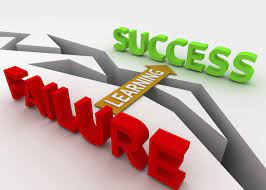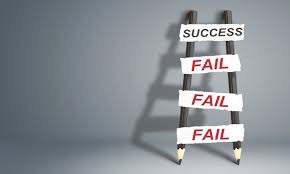Principal Anton Anthony's Insight: Failure as Education's Essential Ingredient for Student Success

Trusting The Process Of Learning To Success

Climbing Out Of Failure To Success
Principal Anton Anthony's Insight: Failure as Education's Essential Ingredient for Student Success
ATLANTA, GEORGIA, UNITED STATES, May 31, 2023/EINPresswire.com/ -- The Importance of Failure: Why Students Need to Experience Setbacks for Success
One of the most influential paradigms in modern education revolves around the concept of success, typically measured by perfect scores, medals, and accolades. This exclusive focus on success, however, inadvertently minimizes the crucial role of failure in learning and personal development. Some might perceive failure as a negative outcome to be avoided, yet research is increasingly highlighting its essential function in fostering resilience, creativity, and growth. In this article, we'll delve into the importance of failure and why it's crucial for students to experience setbacks in their journey to success.
Framing Failure and Success
Success is undeniably attractive and has become the ultimate goal in a majority of educational systems worldwide. This intense focus has sometimes led to an unhealthy fear of failure, creating an atmosphere where students are hesitant to take risks, explore, and experiment. In reality, however, failure is not the opposite of success but rather an integral part of the journey toward it. According to psychologist Dr. Carol Dweck, this is a critical aspect of the 'growth mindset,' which emphasizes learning, persistence, and effort as the keys to success rather than inherent talent or intelligence.
The Science Behind Failure
To better understand why failure is so vital to success, we must first look into the cognitive science behind learning. When we make a mistake or fail, our brains light up with activity. This process is due to the brain's error detection and correction mechanisms kicking in, as explained by neuroscientists like Dr. Jason Moser. In contrast, when we do things correctly, there's less brain activity because we're merely following ingrained patterns. Failing, therefore, is a potent trigger for learning, stimulating our brains to adapt and overcome.
Failure and Creativity
Failure isn't just beneficial for learning; it also plays a significant role in creativity and innovation. The stories of Thomas Edison's numerous unsuccessful attempts before he perfected the light bulb or J.K. Rowling's initial rejections before publishing Harry Potter, are just some examples that showcase the power of persistence. Each failure provided these innovators with valuable feedback, helping them refine their ideas and approaches. This iterative process, common in design thinking, fosters creative problem-solving skills that are indispensable in the 21st-century workforce.
Building Resilience Through Failure
Experiencing failure helps develop resilience, a vital skill for navigating life's ups and downs. In a study conducted by Dr. Mark Seery at the University of Buffalo, students who had dealt with some adversity in life demonstrated better mental health than those who had never experienced hardships. This phenomenon, known as 'stress inoculation,' suggests that encountering manageable levels of stress, like dealing with failure, can build resilience and better equip individuals for future challenges.
Fostering a Healthy Attitude Towards Failure in Education
Given the importance of failure in learning, creativity, and resilience, educators should cultivate an environment where failure is not feared but rather recognized as an opportunity for growth. This can be achieved by praising effort rather than inherent talent, emphasizing the process over the product, and creating safe spaces for experimentation where failure is an accepted part of learning.
Educators can also teach students how to handle failure productively. This process includes encouraging self-reflection, promoting a growth mindset, and providing constructive feedback. Such measures can help students understand that failure isn't a dead-end but a stepping-stone toward improvement and success.
Conclusion
Failure is not a marker of incompetence but rather a crucial step toward growth, creativity, and resilience. Our educational systems must promote the importance of failure, thereby equipping students with the resilience and adaptability needed for navigating life's inevitable challenges. By reframing our understanding of failure, we pave the way for learners to realize their unique paths to success, fortified by the lessons gleaned from their setbacks.
In the enduring words of Thomas Edison, "I have not failed. I've just found 10,000 ways that won't work." This perspective emphasizes that setbacks aren't failings but crucial stepping stones on the path to success. By fostering an educational culture that embraces this philosophy, we can nurture a future generation of resilient, creative, and persevering individuals. These individuals will view failure not as a deterrent but as a transformative part of their personal and academic growth, thus truly finding success in failure.
In crafting this article, various reputable sources have been consulted to present a well-rounded view on the topic. By integrating concepts from psychology, cognitive science, and real-life examples, we hope to have conveyed the importance of failure in personal and academic growth. The perspectives and findings shared in the article can be further explored through the following sources. Each offers additional insights into the pivotal role of failure in fostering resilience, creativity, and success.
Dweck, Carol S. (2006). Mindset: The New Psychology of Success. Ballantine Books.
Moser, Jason S., et al. (2011). "Mind Your Errors: Evidence for a Neural Mechanism Linking Growth Mind-set to Adaptive Posterior Adjustments." Psychological Science, vol. 22, no. 12, pp. 1484-1489.
Edison, Thomas A. (1931). Diary and Sundry Observations of Thomas Alva Edison. Philosophical Library.
Seery, Mark D., et al. (2010). "Whatever does not kill us: Cumulative lifetime adversity, vulnerability, and resilience." Journal of Personality and Social Psychology, vol. 99, no. 6, pp. 1025-1041.
Brown, Tim (2009). Change by Design: How Design Thinking Transforms Organizations and Inspires Innovation. Harper Business.
Duckworth, Angela (2016). Grit: The Power of Passion and Perseverance. Scribner.
Rowling, J.K. (2008). "The Fringe Benefits of Failure, and the Importance of Imagination." Harvard Commencement Address, Harvard University.
Anton Anthony
AA Steam & Entrepreneurship Academy
+1 706-799-2684
email us here
Visit us on social media:
Facebook
Failures are the Pillars of Success
Legal Disclaimer:
EIN Presswire provides this news content "as is" without warranty of any kind. We do not accept any responsibility or liability for the accuracy, content, images, videos, licenses, completeness, legality, or reliability of the information contained in this article. If you have any complaints or copyright issues related to this article, kindly contact the author above.

